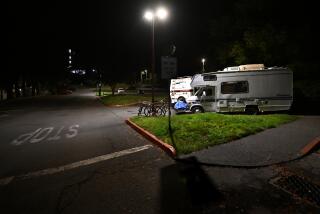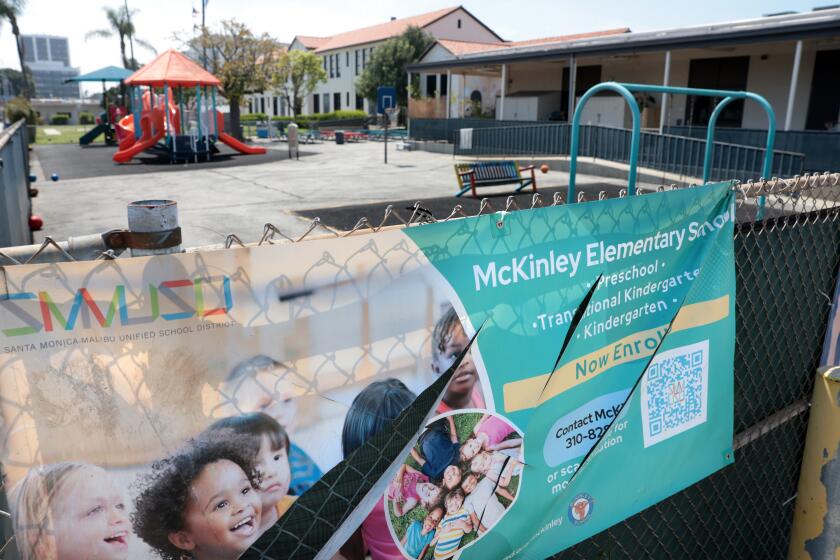Cal State L.A. students fight off extra fees for housing over break. But cost could rise next winter
Some of the students who live in apartments at Cal State Los Angeles don’t go home for the holidays. They have jobs near the El Sereno campus and families who live far away. They would have to scrounge to find a bed or couch surf if they went elsewhere for the five-week break.
Danielle Mayen, 19, would have to be around her older brother, who she says uses drugs in the house.
“I need to stay at school because my household environment is toxic for me. It doesn’t really allow me to focus and be as productive as I could be and ... affects my mental health,” said the second-year sociology student.
This fall though, she learned that the campus had decided to charge extra for students who stayed put. If she wanted to stay in her apartment for the break, she’d have to come up with about $1,115 more.
She didn’t have the money. Nor did many of her friends.
“The people who live at the dorms [are] mostly low-income, first-generation students,” Mayen said. “We can’t afford it.”
So she and other students organized, with help from a professor. They held a campus rally in late November that drew about 100 people, including others in the same boat.
The next week, the university said it would waive the fee this year. Next year, however, officials are planning to impose a charge.
“We are going to have some fees next winter. I mean, we have to,” Cal State L.A. spokesman Robert Lopez said. “But there is no decision yet on what that will be.”
Before initially imposing this year’s fee, the school tried to give students ample notice, Lopez said. Information about the fee went up on the website a year in advance — in December 2017. Emails were sent out in January, and information sessions were held.
Some students said they missed or skimmed the messages, and that the university was not transparent enough about how high the fees would be.
The money would go back into the housing budget, potentially helping to cover maintenance, upkeep and the university’s share of new housing units, Lopez said.
“We are trying to find a solution that works for our students and works for our university,” he said.
Of 28,000 students at Cal State L.A., about 1,000 live in the apartments, each with two or four bedrooms, which students often share.
A large number of students in the California State University system struggle to meet their basic needs. A systemwide survey released in January found that one in 10 said that they had experienced homelessness at least once during the previous year.
The CSU system doesn’t have a unified winter session housing policy for its 23 campuses. Approaches vary. The Chico campus, which houses about 2,200 students, allows them to stay over winter break for free. This season 150 are doing so, according to a campus spokesman. San Diego State has a similar plan — but students who are planning to stay over winter break are asked to say so on the housing application.
Other campuses charge a daily rate, or include the cost of staying over winter break in the housing lease. Cal Poly Pomona, for example, charged $75 per night this year, with a maximum of $525, even if students stayed longer than a week, a spokeswoman said.
Selene Kaal, 19, works at Kohl’s in Alhambra, and started another job this month at Disneyland. Going home from Cal State L.A. to Palmdale for the winter break would make her commute to Disneyland hours longer each day, she said, and she would have to give up the Kohl’s job and reapply next semester, without a guarantee that she would get rehired.
Combined, she works about 40 hours a week, in addition to a full class load that next semester will be squashed into two days of the week. She needs the money she earns, she said. Financial aid and loans don’t fully cover her schooling and the cost of living in L.A.
The Cal State L.A. students plan to fight to eliminate the fee planned for next year, Mayen said. Their goal is first eliminate the fee in L.A., then organize with students to do the same at other campuses.
Reach Sonali Kohli at Sonali.Kohli@latimes.com or on Twitter @Sonali_Kohli.
More to Read
Start your day right
Sign up for Essential California for news, features and recommendations from the L.A. Times and beyond in your inbox six days a week.
You may occasionally receive promotional content from the Los Angeles Times.







